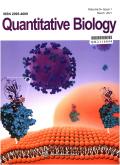不同微生物宿主中通用基因回路的功能可预测性
IF 0.6
4区 生物学
Q4 MATHEMATICAL & COMPUTATIONAL BIOLOGY
引用次数: 0
摘要
虽然合成生物学的原理最初是在模式细菌中确立的,但现在微生物生产者、嗜极生物和肠道微生物已成为生物工程的重要原核生物底盘。要实现合成生物学的概念,就必须扩大宿主范围,使设计的电路能在其中可靠、可预测地发挥作用。在这项工作中,我们系统地描述了两种转录调控模块--T7 RNA 聚合酶激活模块和抑制模块--在三种非模式微生物中的跨物种通用性。我们发现这两个模块在不同生物体内的电路活动具有显著的线性关系。参数化模型拟合揭示了确定这两个模块普遍性的宿主非特异性参数。最后,我们利用这些模块构建了一个遗传 NOT 门和一个带通滤波器电路,并在非模式生物中进行了测试。采用宿主非特异性参数的组合模型成功地定量预测了电路行为,凸显了通用生物部件和预测模型在合成生物工程中的潜力。本文章由计算机程序翻译,如有差异,请以英文原文为准。
Functional predictability of universal gene circuits in diverse microbial hosts
Although the principles of synthetic biology were initially established in model bacteria, microbial producers, extremophiles and gut microbes have now emerged as valuable prokaryotic chassis for biological engineering. Extending the host range in which designed circuits can function reliably and predictably presents a major challenge for the concept of synthetic biology to materialize. In this work, we systematically characterized the cross‐species universality of two transcriptional regulatory modules—the T7 RNA polymerase activator module and the repressors module—in three non‐model microbes. We found striking linear relationships in circuit activities among different organisms for both modules. Parametrized model fitting revealed host non‐specific parameters defining the universality of both modules. Lastly, a genetic NOT gate and a band‐pass filter circuit were constructed from these modules and tested in non‐model organisms. Combined models employing host non‐specific parameters were successful in quantitatively predicting circuit behaviors, underscoring the potential of universal biological parts and predictive modeling in synthetic bioengineering.
求助全文
通过发布文献求助,成功后即可免费获取论文全文。
去求助
来源期刊

Quantitative Biology
MATHEMATICAL & COMPUTATIONAL BIOLOGY-
CiteScore
5.00
自引率
3.20%
发文量
264
期刊介绍:
Quantitative Biology is an interdisciplinary journal that focuses on original research that uses quantitative approaches and technologies to analyze and integrate biological systems, construct and model engineered life systems, and gain a deeper understanding of the life sciences. It aims to provide a platform for not only the analysis but also the integration and construction of biological systems. It is a quarterly journal seeking to provide an inter- and multi-disciplinary forum for a broad blend of peer-reviewed academic papers in order to promote rapid communication and exchange between scientists in the East and the West. The content of Quantitative Biology will mainly focus on the two broad and related areas: ·bioinformatics and computational biology, which focuses on dealing with information technologies and computational methodologies that can efficiently and accurately manipulate –omics data and transform molecular information into biological knowledge. ·systems and synthetic biology, which focuses on complex interactions in biological systems and the emergent functional properties, and on the design and construction of new biological functions and systems. Its goal is to reflect the significant advances made in quantitatively investigating and modeling both natural and engineered life systems at the molecular and higher levels. The journal particularly encourages original papers that link novel theory with cutting-edge experiments, especially in the newly emerging and multi-disciplinary areas of research. The journal also welcomes high-quality reviews and perspective articles.
 求助内容:
求助内容: 应助结果提醒方式:
应助结果提醒方式:


